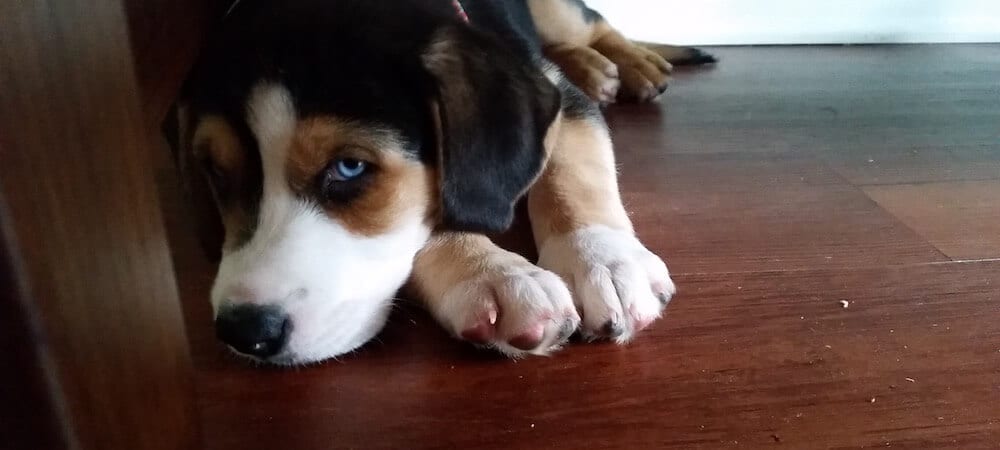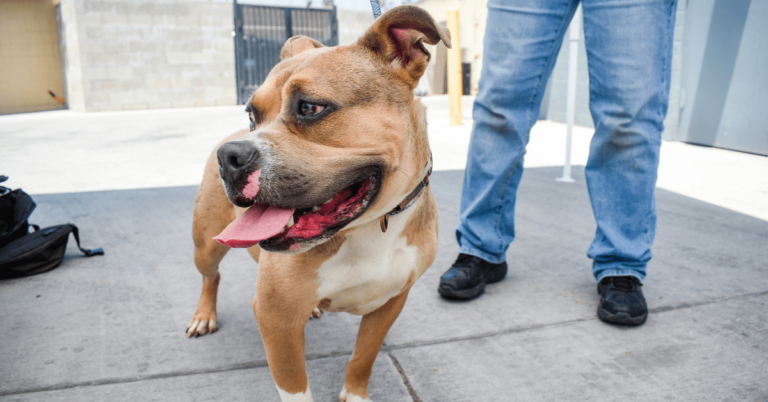Define This Discharge: What Is Coming Out of My Dog?

Dogs are many things: adorable, loyal, smart and sometimes very gross. Yes, dogs are occasionally kind of disgusting. In addition to farting and eating poop, sometimes our furry best friends ooze leaky dog discharge. Here’s our guide to all the different types of gunk that come out of our dogs, how to spot dog infections and how to tell if you need to call the veterinarian!
Anal Gland Fluid
All of our canine buddies have two sacs on either side of the anus called anal glands. These glands, when working properly, secrete a brownish, oily dog discharge with a powerful odor. Anal glands need to expel fluid regularly, either when your dog poops or when you manually express them.
Generally pups don’t leak anal gland fluid when they’re not pooping. If this is happening to your dog, you should contact your vet. You should also call your vet if your dog is dragging their butt along the ground, frequently licking or biting at their anal region or it looks like it hurts when they poop.
Vomit
Dogs occasionally vomit and it’s not necessarily reason to panic. If your pup just throws up once and continues to eat and drink normally and poops as usual, then you’re probably in the clear. It’s also no big deal if your dog eats or drinks too fast and regurgitates shortly afterward. Vomiting is also common on car rides due to motion sickness.
If your dog throws up more than twice, it’s time to call the vet. You should also contact your veterinarian if you notice other symptoms of illness such as:
- Fatigue
- Diarrhea
- Blood in the vomit
- Change in appetite
- Dehydration
- Weight loss
- Increase or decrease in peeing
- Increase or decrease in thirst
- Part of a foreign object in the vomit
- A toxic substance in the vomit
Pus
Unfortunately, sometimes our pals get dog infections and sometimes these infections are accompanied with pus. This dog discharge can be green, yellow or white. Generally it’s opaque, meaning you can’t see through it. The pus might follow a cut or wound. It might also result from gum disease. The dog infection itself might be bacterial, fungal or parasitic. Other signs of infection include:
- Red skin
- Itching
- Hair loss
- Dried discharge
- Crusted skin
- Pustules
- Fever
- Fatigue
- Depression
- Vomiting
- Sneezing
- Bleeding
- Swelling
- Decreased appetite
- Coughing
If you notice your pup is oozing pus or see any signs of dog infections, you need to call your vet immediately.
Eye Boogers
Tiny eye boogers are totally normal in dogs, just like they are in people. If the dog discharge is clear, sometimes it just means that your pup got something in their eye or they’re having issues with allergies. However, here are some signs that something might be wrong and you need to contact your vet:
- Change in the volume, color or consistency of your dog’s eye boogers
- Yellow-green discharge
- Pus-like discharge
- Watery discharge
- Mucus-y discharge
- Red eyes
- Constant blinking
- Squinting
- Dry eyes
- Inflammation
- Crusty eyes
- Pawing at the eyes
- Keeping eyes closed
- Discharge resulting in stained or smelly fur
- Bulging eyes
- Cloudy eyes
Some of these symptoms might mean nothing is wrong, but it’s necessary to have your vet examine your pet and determine if there’s a problem.
Menstrual Blood
There are two easy ways to help determine whether or not the dog discharge coming out of your pooch is menstrual blood. Ask yourself: Is my dog female? And has my female dog been spayed? If you have an unaltered female dog, then yes, the discharge might be menstrual blood. This particular discharge shows up when your dog goes into heat. It can be red or even straw-like in color. Here’s an article with more information about caring for your dog when they go into heat.
Mucus
So you’ve noticed some clearish gooey stuff running out of your dog’s nose. Chances are that this dog discharge is mucus and chances are that your pup’s runny nose is due to illness. A runny nose can be caused by a variety of diseases, including the common cold and the flu. Anytime you notice your dog has a runny nose, you should contact your veterinarian.


